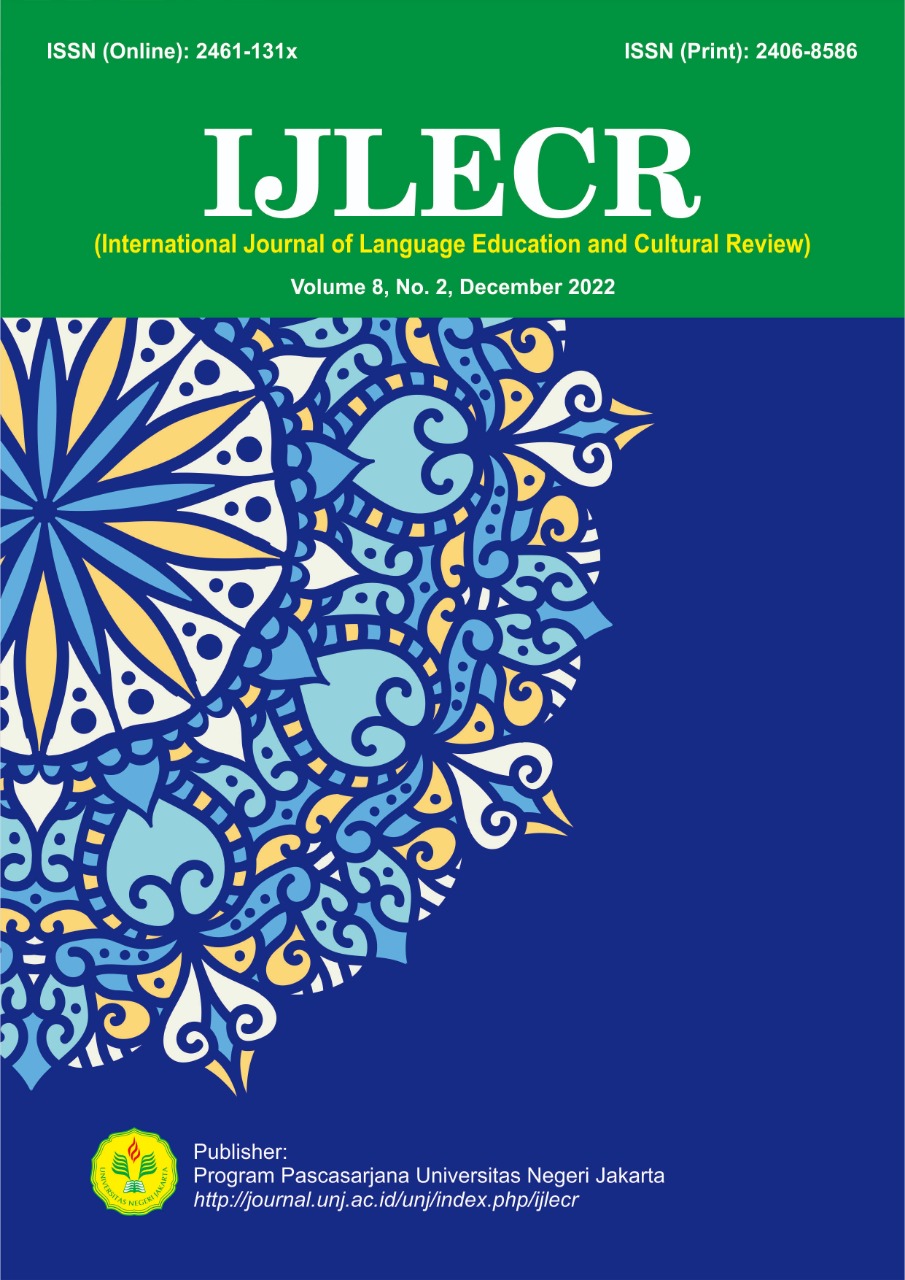The Internalization of the Qur'an Version to Build Students' Character in the Post-Pandemic Covid-19 Era: Pasbiker E-Book to Develop Students’ English Vocabulary and Grammar
DOI:
https://doi.org/10.21009/ijlecr.v8i2.29763Keywords:
character building, , English vocabulary, English grammar, internalization of Al-Qur'an verses, Paskiber-based e-bookAbstract
Building character can be done by internalizing the Qur'anic verses so that any religion can still take the noble values in it. The objectives of this study are to increas students' competence, especially in terms of mastery and improvement of vocabulary and understanding of grammar gradually through the "Keledai Cerdik" technique based on subject matter that has been internalized with verses of the Qur'an and to give brief information about how the PASBIKER book works to increase vocabulary and mastery of grammar. This research method used the research and mevelopment method through the questionnaires and test. The research result found that both the mastery of vocabulary, grammar, and the values taught on the internalization of the verses of the Qur'an will be documented in detail in a book called "Polis Asuransi Berbahasa Inggris Keledai Cerdik (PASBIKER)”. It gives positive impacts on studets’ vocabulary and grammar mastery. It is suggested to consider the students’ needs in developing the material.
References
Akbarjono, A. (2018). Eksistensi guru dalam penanaman nilai pendidikan Islam. At-Ta’lim, 17(2). https://ejournal.iainbengkulu.ac.id/index.php/attalim/article/view/1408/1190
Al Bataineh, K. B., Banikalef, A., & H Albashtawi, A. (2019). The effect of blended learning on EFL students’ grammar performance and attitudes: an investigation of moodle. Arab World English Journal (AWEJ), 10(1). https://papers.ssrn.com/sol3/papers.cfm?abstract_id=3367595
Anas, N. (2013). The integration of knowledge in Islam: Concep anda challenges. Global Journal of Human Social Science Linguistic and, 13(10). https://globaljournals.org/item/2123-the-integration-of-knowledge-in-islam-concept-and-challenges
Borg, W. R., & Gall, M. D. (1989). Educational research. New York: Longman.
Cohen, L. (1996). Teaching vocabulary. London: Routledge.
Elaish, M. M., Ghani, N. A., Shuib, L., & Al-Haiqi, A. (2019). Development of a mobile game application to boost students’ motivation in learning English vocabulary. IEEE Access, 7, 13326-13337. https://ieeexplore.ieee.org/document/8611332
Kurniadi, Y. (2018). The effect of teaching media and vocabulary mastery on students’ speaking skill (Experiment at the tenth grade of state senior high school in Tasikmalaya-West Java). Journal of English Language Teaching, 1(1), 58-69. https://journal.lppmunindra.ac.id/index.php/inference/article/view/3817
Masrukhi, M. R. (2020). Urgensi pendidikan karakter pada masa pandemi Covid 19. Seminar Nasional Pascasarjana 2020. Semarang.
Meysitta, L. (2018). Perkembangan kosakata serapan bahasa asing dalam KBBI. Jurnal Pendidikan Bahasa dan Sastra Indonesia (BAPALA), 5(2), https://jurnalmahasiswa.unesa.ac.id/index.php/bapala/article/view/23982
Nafisah, F., & Zafi, A. (2020). Model pendidikan karakter berbasis keluarga perspektif Islam di tengah pendemi Covid-19. Ta’allum: Jurnal Pendidikan Islam, 8(1), 1-20. https://ejournal.uinsatu.ac.id/index.php/taalum/article/view/2999
Ratminingsih, N. M. (2017). Metode pembelajaran bahasa Inggris. Depok: Rajawali Press.
Safrijal. (2015). Model pembelajaran inkuiri terinternalisasi ayat-ayat Al-Qur'an untuk meningkatkan pemahaman konsep larutan penyangga dan karakter Islami siswa. lantanida Jounal, 3(1). https://jurnal.ar-raniry.ac.id/index.php/lantanida/article/view/1832/0
Sormin, A. E. (2016). Perlindungan hukum polis atas perusahaan asuransi yang dipailitkan. JOM Fakultas Hukum, 3(2), 2-11.
Tarigan, H. (2011). Pengajaran kosakata. Bandung: Angkasa.








